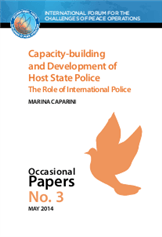OCCASIONAL PAPER No. 3, MAY 2014 Capacity-building and Development of Host State Police: The Role of International Police

The UN Police Policy represents a significant achievement in setting out in one comprehensive overarching document the core functions and fundamental principles to guide the UN police in carrying out their mandated tasks.
This study begins with a brief review of the evolution of the police component and its mandated roles in UN peacekeeping operations.
It then extracts and summarizes what the Police Policy says about police capacity-building and development, one of the four core key elements of a police peacekeeping operation.
The paper then discusses several outstanding questions and key challenges that will need to be further explored and elucidated in further guidance for UN police peacekeepers with regard to capacity-building and development.
CONTENT
1. Introduction
2. Evolution of the Police Component in UN Peacekeeping and Special Political Missions
5. Key Challenges and Lessons Learned in Police Capacity-building and Development
- Police and Police Reform are Fundamentally Political
- Creating Guidelines that can and will be Operationalized in the Field
- Defining Key Contested Concepts and Approaches in Policing
- Recruiting Appropriate Personnel for Police Capacity-building and Development Tasks
- Transferring and Developing Knowledge
- Adapting Capacity-building and Development to the Local Context and Local Ownership
- Coordinating Capacity-building and Development
- Police Capacity-building and Development in Hybrid Systems
- Effective Monitoring and Evaluation of Police Capacity-building and Development
6. Conclusion
Appendix: DPKO/DFS Policy on United Nations Police in Peacekeeping Operations and Special Political Missions
Marina Caparini is Senior Research Fellow at the Norwegian Institute of International Affairs (NUPI), where she conducts applied, policy-relevant research in the area of policing, security and justice governance in post-authoritarian and post-conflict environments. She is also Senior Associate at Security Governance Group. Her recent projects include an assessment of the police and criminal justice system in Guinea to inform US Bureau of International Narcotics and Law Enforcement Affairs (INL)/State Department programming, a review of the police component of the Norwegian Ministry of Foreign Affairs’ Training for Peace Programme to build African peacekeeping capacity, and an analysis of a joint government of Liberia—United Nations initiative aimed at decentralizing policing and justice services within Liberia through regional capacity development and service hubs. She was previously Deputy Director of the Security System Reform Program at the International Center for Transitional Justice, and formerly Senior Fellow at the Geneva Centre for the Democratic Control of Armed Forces. She holds a PhD in War Studies from King’s College London.

